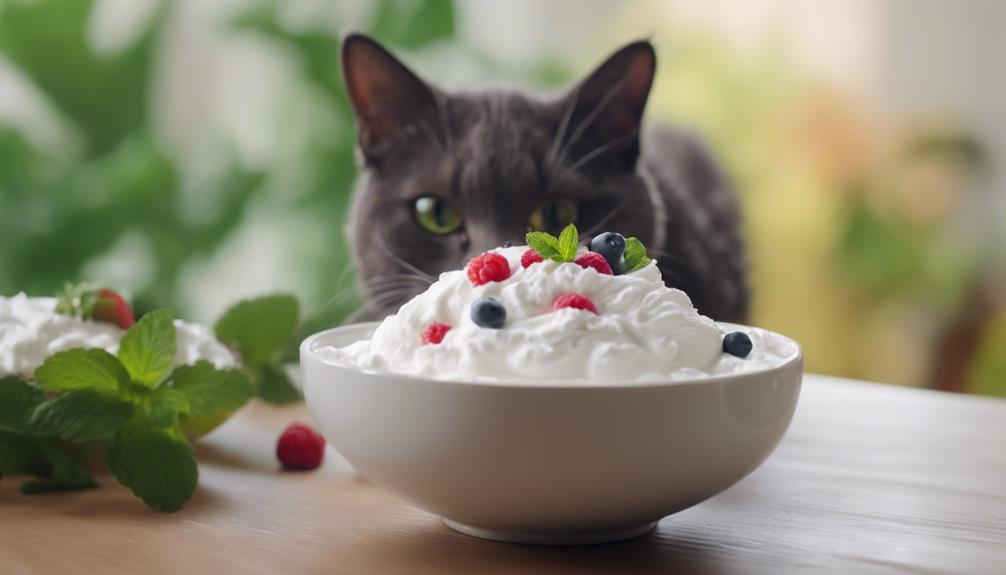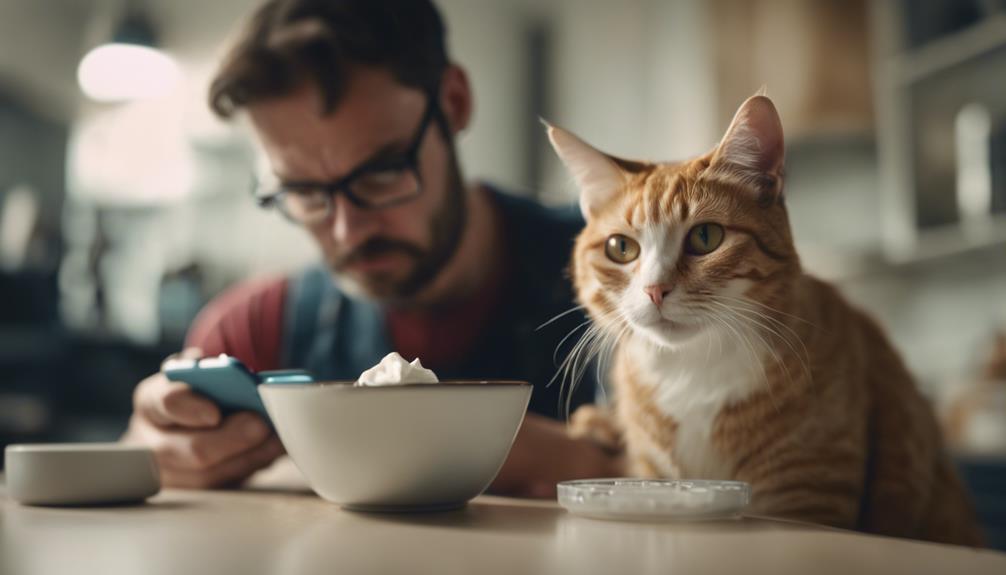In the realm of feline dietary considerations, the inclusion of whipped cream in a cat's diet prompts a thoughtful exploration into potential risks and implications. While the idea of treating our feline companions to a dollop of this creamy delight may seem appealing, the underlying factors warrant careful examination.
Understanding how cats metabolize dairy-based products and the impact of added sugars on their digestive systems is crucial in making informed decisions about their dietary choices. As we navigate the nuances of feline nutrition, the question remains: Can cats safely enjoy whipped cream, or are there alternative treats that better align with their dietary needs?
Key Takeaways
- Cats should avoid whipped cream due to potential gastrointestinal issues from milk, sugar, and additives.
- Opt for safe treats like apples, bananas, blueberries, and meaty cat treats under veterinary guidance.
- Whipped cream alternatives with oils, syrups, or xylitol are harmful to cats and should be avoided.
- Stick to cat-friendly snacks aligned with their nutritional needs and consult a vet before introducing new foods.
Cats' Nutritional Needs
For feline companions, meeting their unique nutritional requirements is essential to ensure their overall health and well-being. Cats are obligate carnivores, meaning their diet should mainly consist of animal-based nutrients. Properly formulated cat food provides the necessary balance of proteins, fats, vitamins, and minerals essential for their optimal health.
When considering treats for your cat, it's crucial to offer them in moderation, ensuring they make up less than 10% of their daily caloric intake. While whipped cream might seem like a tempting treat, it contains ingredients like milk, sugar, and additives that can potentially lead to gastrointestinal issues such as bloating and diarrhea in cats.
Prioritizing a diet rich in meaty goodness and consulting your veterinarian for guidance on suitable treats can help support your cat's nutritional needs effectively.
Risks of Whipped Cream Treats
When considering the potential hazards of offering whipped cream as a treat to cats, it is crucial to be aware of the risks associated with its ingredients. Here are four reasons to be cautious:
- Digestive Upset: Cats may experience gastrointestinal issues like bloating and diarrhea due to the milk and sugar content in whipped cream.
- Weight Gain: Regular consumption of whipped cream can lead to obesity in cats, affecting their overall health.
- Lactose Intolerance: Many cats are lactose intolerant, making dairy-based treats like whipped cream difficult for them to digest.
- Additive Concerns: Additives in whipped cream can be harmful to cats, potentially causing allergic reactions or other health problems.
Being mindful of these risks can help protect your feline friend from potential harm.
Whipped Cream Alternatives to Consider

Considering the potential risks associated with offering whipped cream to cats, exploring suitable alternatives that align with feline dietary needs is essential for maintaining their health and well-being. When looking for whipped cream alternatives for your feline friend, it's crucial to prioritize their well-being and nutritional requirements. Here are some options to consider:
| Whipped Cream Alternatives | Why Consider |
|---|---|
| Greek Yogurt | Contains probiotics for gut health |
| Canned Pumpkin | High in fiber, aids digestion |
| Plain Mashed Sweet Potatoes | Rich in vitamins and minerals |
| Catnip-Infused Water | Provides hydration and enjoyment |
These alternatives can provide a safe and enjoyable experience for your cat without the potential risks associated with whipped cream.
Safe Sweet Treats for Felines
Exploring suitable sweet treats for felines that align with their dietary needs and health requirements is essential for maintaining their overall well-being.
- Fresh Fruits: Apples, bananas, blueberries, and strawberries can provide a sweet and healthy snack for your feline friend.
- Sweet Potatoes: Baked or boiled sweet potatoes are a tasty treat that offers essential vitamins and fiber for your cat's diet.
- Meaty Cat Treats: Opt for commercial or homemade treats rich in meaty goodness to satisfy your cat's cravings.
- Nutrient-Rich Vegetables: Certain vegetables like carrots and green beans can serve as nutritious snacks for cats, promoting their well-being and providing a satisfying crunch.
Choosing these safe sweet treats can offer your cat a delightful indulgence while ensuring they receive proper nutrition and care.
Consulting a Veterinarian

To ensure your cat's dietary choices align with their health needs, seeking guidance from a veterinarian is paramount. Veterinarians possess the expertise to offer tailored advice based on your cat's individual health requirements.
Before introducing any new food, including whipped cream, consulting with a vet can help prevent potential health issues and ensure your cat's well-being. They can provide insights on suitable treats, portion sizes, and any dietary restrictions your cat may have.
Exploring Suitable Cat Snacks
What are some nutritious and safe snack options for cats to enjoy in their diet?
When considering suitable snacks for your feline friend, it's essential to choose options that align with their dietary needs. Here are four cat-friendly snack choices to keep your pet healthy and happy:
- Cooked Chicken: A lean source of protein that cats love.
- Salmon: Rich in omega-3 fatty acids, beneficial for your cat's skin and coat.
- Catnip: A herb that can provide mental stimulation and enjoyment for your cat.
- Green Peas: High in fiber and vitamins, peas can be a tasty and nutritious snack in moderation.
These options can add variety to your cat's diet while ensuring they receive the necessary nutrients to thrive.
Conclusion
In conclusion, understanding the nutritional needs of cats is crucial in determining suitable treats for our feline companions.
While whipped cream may pose risks to their gastrointestinal health, exploring alternative options and consulting a veterinarian can help ensure their well-being.
By being mindful of their dietary requirements and opting for safe sweet treats, we can indulge our cats in a responsible and enjoyable manner.
Remember, moderation is key in keeping our feline friends happy and healthy.




